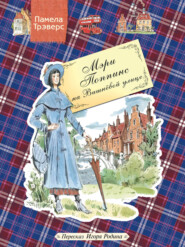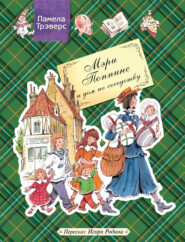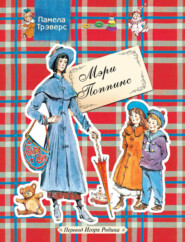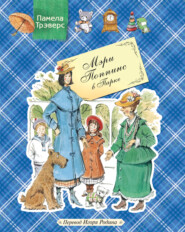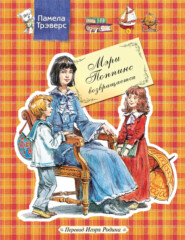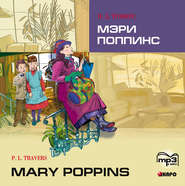По всем вопросам обращайтесь на: info@litportal.ru
(©) 2003-2025.
✖
Mary Poppins - the Complete Collection
Настройки чтения
Размер шрифта
Высота строк
Поля
Miss Annie put down her pail of glue, and Miss Fannie swung the ladders from her shoulder and steadied them until both stood in an upright position. Then she held one and Miss Annie the other.
“What on earth are they going to do?” said Michael, gaping. But there was no need for Jane to reply, for he could see for himself what was happening.
As soon as Miss Fannie and Miss Annie had so fixed the ladders that they seemed to be standing with one end on the earth and the other leaning on the sky, Mrs Corry picked up her skirts and the paintbrush in one hand and the pail of glue in the other. Then she set her foot on the lowest rung of one of the ladders and began to climb it. Mary Poppins, carrying her basket, climbed the other.
Then Jane and Michael saw a most amazing sight. As soon as she arrived at the top of her ladder, Mrs Corry dipped her brush into the glue and began slapping the sticky substance against the sky. And Mary Poppins, when this had been done, took something shiny from her basket and fixed it to the glue. When she took her hand away they saw that she was sticking the Gingerbread Stars to the sky. As each one was placed in position it began to twinkle furiously, sending out rays of sparkling golden light.
“They’re ours!” said Michael breathlessly. “They’re our stars. She thought we were asleep and came in and took them!”
But Jane was silent. She was watching Mrs Corry splashing the glue on the sky and Mary Poppins sticking on the stars and Miss Fannie and Miss Annie moving the ladders to a new position as the spaces in the sky became filled up.
At last it was over. Mary Poppins shook out her basket and showed Mrs Corry that there was nothing left in it. Then they came down from the ladders and the procession started down the hill again, Miss Fannie shouldering the ladders, Miss Annie jangling her empty glue pail. At the corner they stood talking for a moment; then Mary Poppins shook hands with them all and hurried up the Lane again. Mrs Corry, dancing lightly in her elastic-sided boots and holding her skirts daintily with her hands, disappeared in the other direction with her huge daughters stumping noisily behind her.
The garden gate clicked. Footsteps creaked on the path. The front door opened and shut with a soft clanging sound. Presently they heard Mary Poppins come quietly up the stairs, tiptoe past the nursery and go on into the room where she slept with John and Barbara.
As the sound of her footsteps died away, Jane and Michael looked at each other. Then without a word they went together to the top left-hand drawer and looked.
There was nothing there but a pile of Jane’s handkerchiefs.
“I told you so,” said Michael.
Next they went to the wardrobe and looked into the shoe box. It was empty.
“But how? But why?” said Michael, sitting down on the edge of his bed and staring at Jane.
Jane said nothing. She just sat beside him with her arms round her knees and thought and thought and thought. At last she shook back her hair and stretched herself and stood up.
“What I want to know,” she said, “is this: Are the stars gold paper or is the gold paper stars?”
There was no reply to her question and she did not expect one. She knew that only somebody very much wiser than Michael could give her the right answer. . .
Chapter Nine (#ulink_c6117e31-e38c-5bb4-af4e-6d89ee7764c2)
JOHN AND BARBARA’S STORY (#u5f79d44c-2b23-5b60-a7b5-41885b575274)
JANE AND MICHAEL had gone off to a party, wearing their best clothes and looking, as Ellen the housemaid said when she saw them, “just like a shop window.”
All the afternoon the house was very quiet and still, as though it were thinking its own thoughts, or dreaming perhaps.
Down in the kitchen Mrs Brill was reading the paper with her spectacles perched on her nose. Robertson Ay was sitting in the garden busily doing nothing. Mrs Banks was on the drawing-room sofa with her feet up. And the house stood very quietly around them all, dreaming its own dreams, or thinking perhaps.
Upstairs in the nursery Mary Poppins was airing the clothes by the fire, and the sunlight poured in at the window, flickering on the white walls, dancing over the cots where the babies were lying.
“I say, move over! You’re right in my eyes,” said John in a loud voice.
“Sorry!” said the sunlight. “But I can’t help it. I’ve got to get across this room somehow. Orders is orders. I must move from East to West in a day and my way lies through this Nursery. Sorry! Shut your eyes and you won’t notice me.”
The gold shaft of sunlight lengthened across the room. It was obviously moving as quickly as it could in order to oblige John.
“How soft, how sweet you are! I love you,” said Barbara, holding out her hands to its shining warmth.
“Good girl,” said the sunlight approvingly, and moved up over her cheeks and into her hair with a light, caressing movement. “Do you like the feel of me?” it said, as though it loved being praised.
“Dee-licious!” said Barbara, with a happy sigh.
“Chatter, chatter, chatter! I never heard such a place for chatter. There’s always somebody talking in this room,” said a shrill voice at the window.
John and Barbara looked up.
It was the Starling who lived on the top of the chimney.
“I like that,” said Mary Poppins, turning round quickly. “What about yourself? All day long – yes, and half the night, too, on the roofs and telegraph poles. Roaring and screaming and shouting – you’d talk the leg off a chair, you would. Worse than any sparrer, and that’s the truth.”
The Starling cocked his head on one side and looked down at her from his perch on the window frame.
“Well,” he said, “I have my business to attend to. Consultations, discussions, arguments, bargaining. And that, of course, necessitates a certain amount of – er – quiet conversation—”
“Quiet!” exclaimed John, laughing heartily.
“And I wasn’t talking to you, young man,” said the Starling, hopping down on to the window sill. “And you needn’t talk – anyway. I heard you for several hours on end last Saturday week. Goodness, I thought you’d never stop – you kept me awake all night.”
“That wasn’t talking,” said John. “I was—” He paused. “I mean, I had a pain.”
“Humph!” said the Starling, and hopped on to the railing of Barbara’s cot. He sidled along it until he came to the head of the cot. Then he said in a soft, wheedling voice:
“Well, Barbara B., anything for the old fellow today, eh?”
Barbara pulled herself into a sitting position by holding on to one of the bars of her cot.
“There’s the other half of my arrowroot biscuit,” she said, and held it out in her round, fat fist.
The Starling swooped down, plucked it out of her hand and flew back to the windowsill. He began nibbling it greedily.
“Thank you!” said Mary Poppins, meaningly, but the Starling was too busy eating to notice the rebuke.
“I said ‘Thank you!’” said Mary Poppins a little louder.
The Starling looked up.
“Eh – what? Oh, get along, girl, get along. I’ve no time for such frills and furbelows.” And he gobbled up all but the last crumbs of his biscuit.
The room was very quiet.
John, drowsing in the sunlight, put the toes of his right foot into his mouth and ran them along the place where his teeth were just beginning to come through.
“Why do you bother to do that?” said Barbara, in her soft, amused voice that seemed always to be full of laughter. “There’s nobody to see you.”
“I know,” said John, playing a tune on his toes. “But I like to keep in practice. It does so amuse the Grown-ups. Did you notice that Aunt Flossie nearly went mad with delight when I did it yesterday? ‘The Darling, the Clever, the Marvel, the Creature!’ – didn’t you hear her say all that?” And John threw his foot from him and roared with laughter as he thought of Aunt Flossie.






